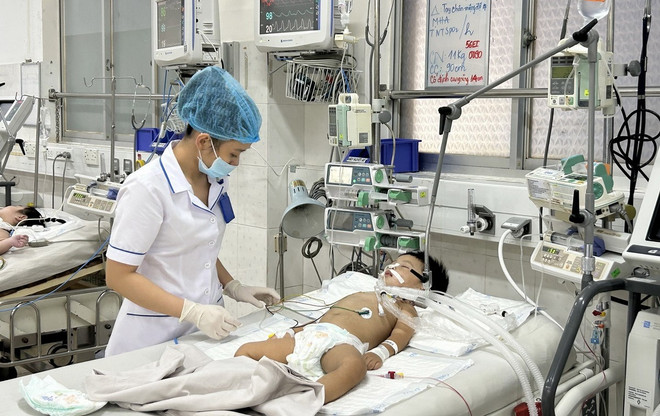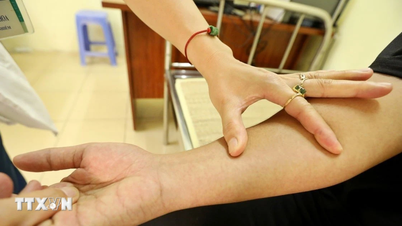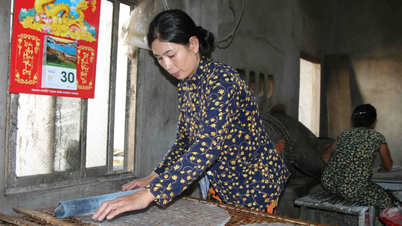In recent days, the number of dengue fever cases in Ho Chi Minh City has shown signs of increasing and is higher than the same period in 2024.
In particular, end-line hospitals in the area have received many cases of dengue shock syndrome in children, warning of the dangers of this epidemic.
Many cases of overweight children with underlying diseases have dengue fever
Specifically, on May 14, Dr. Nguyen Minh Tien, Deputy Director of the City Children's Hospital, informed that the unit had received a girl named HNGH (10 years old, residing in Binh Chanh district, Ho Chi Minh City) in a state of severe dengue shock.
Previously, the girl had a high fever for 2 consecutive days. On the 3rd day, she had a stomachache, vomited brown mucus, and had cold hands and feet, so her family took her to the local hospital and was diagnosed with severe dengue shock on the 3rd day.
However, due to the child's worsening condition, showing signs of respiratory failure, blood clotting disorders, gastrointestinal bleeding, and severe liver damage, he was transferred to the City Children's Hospital.
Here, the child was diagnosed with severe dengue shock, blood clotting disorder, gastrointestinal bleeding, liver damage, severe respiratory failure on an overweight and obese body (the girl weighed 50 kg, while the average weight at this age is about 30-32 kg).
Doctors continued to infuse high molecular fluids, fight shock with the support of invasive arterial blood pressure measurement devices, and use combined vasopressors.
The patient also received respiratory support with continuous positive airway pressure, non-invasive ventilation, then early intubation and mechanical ventilation, and peritoneal puncture for decompression.
To resolve the blood clotting disorder and severe gastrointestinal bleeding, doctors transfused blood, fresh frozen plasma, cryoprecipitate, platelet concentrate, and provided liver support. After nearly 12 days of treatment, the child gradually recovered, was weaned off the ventilator, became alert, and liver and kidney function returned to normal.
At Children's Hospital 2, in early May, the hospital also received treatment for a 12-year-old boy from Ninh Thuan province who was suffering from dengue shock.
Before that, the boy had a high fever and was treated at home for 2 days. His family said that he had been examined at a clinic near his home but was diagnosed with pharyngitis. He took medicine for 3 days but it did not improve.
After that, the boy became more tired, had increasing abdominal pain, vomited, had diarrhea several times with nosebleeds. His family took him to the local hospital in a state of shock, blood concentration, platelets 5-6 times lower than normal, liver enzymes 5 times higher than normal, rapid pulse and was transferred to Children's Hospital 2.
Doctor Do Chau Viet, Head of the Infectious Intensive Care Unit, Children's Hospital 2, said that at the time of admission, the child was in respiratory failure and had to be given oxygen and high molecular fluids. In this case, the child had a history of asthma and was overweight or obese, making treatment more difficult.
Notably, according to Dr. Viet, since the beginning of the year, the unit has also received many cases of overweight children with underlying diseases suffering from dengue fever - these are factors that make it easy to fall into a state of dengue shock that can be life-threatening.
Dengue fever cases increased by 136% compared to the same period in 2024
According to the City Center for Disease Control, Ho Chi Minh City and the southern provinces and cities have entered the rainy season, which means the dengue fever season has also begun, so people should not be subjective about this dangerous infectious disease.
From the beginning of 2025 to May 11, the area recorded 7,398 cases of dengue fever, an increase of 136% compared to the same period in 2024. According to forecasts, this year the dengue fever season came earlier and could increase the risk of a widespread outbreak.

Doctors recommend that people pay attention to implementing good disease prevention measures such as killing mosquitoes and larvae, sleeping under mosquito nets, cleaning containers, clearing water flow, avoiding stagnant water to limit the growth and development of Aedes mosquitoes, which are the intermediary causing dengue fever. Currently, there is a vaccine to prevent dengue fever for children 4 years of age and older and adults.
For families with children, parents need to pay attention to the signs of: sudden high fever, continuous with symptoms of headache, loss of appetite, nausea, muscle pain, joint pain, pain in the eye socket, skin and mucous membrane bleeding...
Because the disease can progress rapidly and cause dangerous complications, as soon as the child shows signs of worsening such as restlessness, lethargy, severe abdominal pain, vomiting, bleeding (gums, nose, vomiting blood, blood in urine, etc.), and difficulty breathing, they should be taken to the hospital immediately./.
Source: https://www.vietnamplus.vn/thanh-pho-ho-chi-minh-nhieu-tre-em-gap-nguy-hiem-do-soc-sot-xuat-huyet-post1038856.vnp



![[Photo] T&T 1 and Ho Chi Minh City 1 People's Police Teams won the men's and women's team championships](https://vphoto.vietnam.vn/thumb/1200x675/vietnam/resource/IMAGE/2025/5/22/39db06ae67cb4001b7a556e8d9a56d07)





















































































![[Podcast] Week introducing more than 500 OCOP products in Hanoi](https://vphoto.vietnam.vn/thumb/402x226/vietnam/resource/IMAGE/2025/5/22/d144aac2416744718388dbae3260e7fd)


Comment (0)